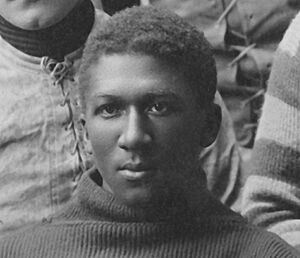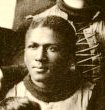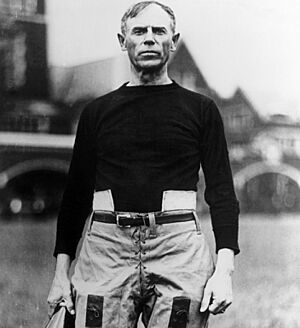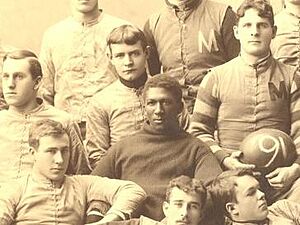George Jewett facts for kids
George Henry Jewett II (born April 1870 – died August 12, 1908) was an amazing American athlete. He made history by becoming the very first African-American football player at both the University of Michigan and Northwestern University. He was also the first in the Big Ten Conference, a major group of college sports teams.
Jewett played for the Michigan Wolverines as a fullback, halfback, and field goal kicker in 1890 and 1892. Many people thought he was one of Michigan's greatest players from that time.
Contents
Early Life and School
Jewett grew up in Ann Arbor, Michigan. His father was a successful blacksmith. George was born in April 1870. He had an older sister named Mary. His family lived in Ann Arbor for many years.
Jewett went to Ann Arbor High School. He was the top student in his class when he graduated in 1889. In high school, he was the captain of the debate team, the football team, and the baseball team. He was also known as the fastest sprinter in the Midwest. He won a big race called the 100-yard dash. Plus, he spoke German, Italian, and French very well!
College Football Journey
Playing for Michigan
George Jewett attended the University of Michigan from 1890 to 1893. He became the first African American in the school's history to earn a special award called a 'varsity letter' for playing on the main football team.
In 1890, Jewett was the starting fullback for Michigan. That year, the team won 4 games and lost only 1. They scored 129 points while their opponents scored only 36.
In 1892, Jewett played as a halfback. The Michigan team had a great season, winning 7 games. They even beat Amos Alonzo Stagg's team from the University of Chicago. Jewett was the team's best at running with the ball, scoring points, and kicking field goals. People called him "one of the greatest stars" in Michigan football before a famous coach named Fielding H. Yost arrived. He was also known as an "amazing African-American athlete" from the University of Michigan.
Even other coaches thought highly of him. Oberlin College coach John Heisman said Jewett was a "really great athlete." And University of Chicago coach Amos Alonzo Stagg called him "a very tough player to go against."
Famous Game Against Oberlin College
In 1892, Jewett played a big part in a memorable game against Oberlin College. Their coach was John Heisman, who would become very famous later. The game was played in Ann Arbor in November 1892.
Jewett scored four touchdowns in that game! One time, he ran 45 yards for a touchdown when the Oberlin team thought the game clock had stopped. Later, Oberlin was ahead 12-6. Jewett scored another touchdown from 25 yards out, but his kick missed. The score was 12-10. Oberlin scored again, making it 18-10.
A few minutes later, Jewett ran very close to the goal line. The umpire, who used to play for Michigan, said Jewett had scored a touchdown. Jewett made the extra kick, and the score became 18-16. Jewett also made a huge tackle in the game. He chased down an Oberlin player who had run almost the whole field, stopping him just before he could score.
The game ended in a bit of a mix-up. Oberlin scored to go ahead 24-22. The referee, who was an Oberlin player, then said time was up and ended the game. But the umpire, who was from Michigan, said there were still four minutes left because of timeouts that Oberlin's timekeeper had missed. As the Oberlin team left the field, thinking they had won, Michigan quickly lined up. Jewett then walked the ball across the goal line for Michigan's fifth touchdown! The next day, the school newspaper, Michigan Daily, wrote about the confusion. Both schools still count the game as a win for themselves!
Playing for Northwestern
Jewett studied medicine at Michigan. He later transferred to Northwestern University in 1893. There, he earned his medical degree. He also became the first African American to play for the Northwestern Wildcats football team.
George Jewett was not just the first African-American football player at Michigan and Northwestern. He was also the first African-American athlete to earn a letter in football for any of the schools that later formed the Big Ten Conference. After Jewett broke this barrier at Michigan in 1890, other African-American players followed in the Big Ten. These included Fred Patterson at Ohio State University and Preston Eagleson at Indiana University.
Jewett was almost the very first African American in college football history. That honor went to William Henry Lewis and William Tecumseh Sherman Jackson, who played for Amherst in 1889, one year before Jewett.
It's also interesting to know that eight years before Jewett played football for Michigan, Moses Fleetwood Walker became the first African American to earn a letter for Michigan, but he did it on the baseball team.
Later Life and Legacy
After college, Jewett became a doctor and practiced medicine in the Chicago area. He later returned to Ann Arbor in 1899. In 1900, he was living with his parents. He worked as a janitor, while his sister was a music teacher and his father was still a blacksmith.
Jewett later opened his own business in Ann Arbor called The Valet. It was a shop that cleaned and pressed clothes. His shop was on State Street.
On November 4, 1901, Jewett married Lillian Zebbs. They had two sons: George H. Jewett (born 1902) and Richard Jewett (born 1908).
Sadly, George Jewett passed away suddenly in 1908 when he was only 38 years old. His son Richard was just eight days old when his father died. Richard later became the father of Coleman Jewett, who was a well-known athlete, educator, and craftsman in Ann Arbor. Coleman was the grandfather of Michael Jewett, who hosts a jazz radio show.
George Jewett is buried at Forest Hill Cemetery in Ann Arbor. In March 2004, he was honored by being added to the Pioneer High School Hall of Fame.
Since 2021, there's a special award called the George Jewett Trophy. This trophy is given to the winner of the football game between Michigan and Northwestern. It's the first major college football trophy named after an African-American player.
 | Audre Lorde |
 | John Berry Meachum |
 | Ferdinand Lee Barnett |





